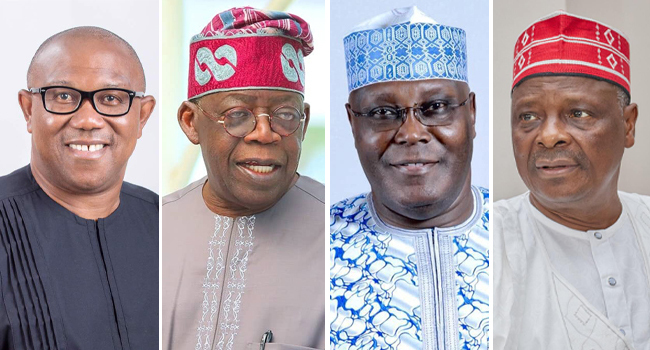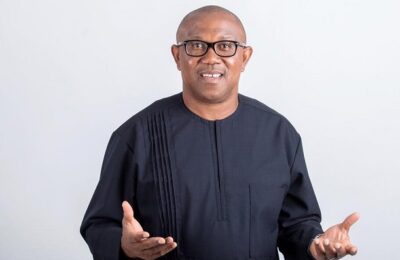Just before the Supreme Court have judgment of October 26, 2023 which dismissed petitions against the victory of Mr Bola Ahmed Tinubu in the February 2023 presidential poll, someone said that Mr Peter Obi had started the quest for the 2027 Nigerian presidential race.
The assessment was against the backdrop of Obi’s resumption of donations to groups and institutions, with significant extension of the public relations drive to Islamic organisations.
Recently, Mr Victor Anazonwu, an avowed ‘Obidient’ sent me the blurb of his book: “Obidience:
Reflections on an Ideology & A People’s Movement”. Although I presume Anazonwu to be working on personal initiative, the publication nevertheless suggests a determination of the constituency to remain relevant in the power game in the foreseeable future.
Following his bold but unsuccessful legal bid for disclosure of Tinubu’s American files, veteran of presidential contests, Atiku Abubakar, has hinted of continued active participation in politics. Atiku, while calling on the youth to lead the struggle for democratisation, stated: “As for me and my party, this phase of our work is done. However, I am not going away. I will continue to struggle with other Nigerians to deepen our democracy.”
Atiku has gone a step further to propose formation of opposition coalition against the APC. While the invitation has elicited mixed responses so far, viability of the plan in the process to 2027 remains to be seen.
And so, even with the post – poll direction of the former NNPP candidate, Rabiu Kwankwaso unclear, there has already emerged significant opposition to the presidential tenancy of Tinubu’s APC.
Obi, in particular, has been stepping up the game against the government, deploying the opportunity cost theory to great effect in his criticisms. When the former Anambra State Governor relates N160m vehicle grant for a member of the National Assembly with a Professor’s 30 years salary of N145m, he captures public attention forcefully. Ditto for the comparison of N15b budget for completion of the Vice President’s lodge as equivalent annual salary of 3000 Professors! The message of an anti people government could hardly be missed by a population groaning from hunger and low living standards.
Yet, what is the response of Tinubu’s presidency to the state of the polity? How does the APC government perceive it’s control of power vis a vis the demands of social contract? Can we spot sensitivity of Tinubu’s administration to the need for national healing following the most divisive presidential poll since 1979?
In six months of presidential power, the Ahmed Tinubu – APC axis has served notice of its inclination towards a civilian authority rather than democratic leadership. Tinubu and his henchmen are set on the path of imperial presidency notoriously walked by Olusegun Obasanjo, who perceived undermining the rule of law as show of strength.
The treatment meted out to former CBN Governor, Godwin Emefiele, hints at the current administration’s sense of power. In seven months of Emefiele’s dislocation, what emerges from the drama of arrest, court bail and rearrest, is not an intent at fair trial but effort to play the boss and teach a lesson. In this same climate of power rule, APC’s Hope Uzodimma is declared winner of Imo State Governorship election with the Guinness world record of 540, 308 votes. This dizzying figure is 187, 404 votes higher than what Peter Obi, the candidate of regional and generational anger scored in the presidential poll in the same Imo State. The show of power is taken to another dimension with Nyesom Wike’s privatisation of public office agenda in Rivers State. And the FCT Minister does not appear to find the plot against Governor Siminalayi Fubara embarrassing or see anything wrong with his ambition of dictating to his successor.
Without doubt, elastic exercise of presidential power is not peculiar to the present government. Obasanjo’s presidency arrogated to itself the right to remove elected State Governors in the name of State of Emergency. Not done, it sponsored the impeachment of Governors with minority numbers of state legislators. Under Jonathan’s presidency, PDP used federal might to rig out APGA at national assembly elections in the southeast. In wanton disregard of federal character provision in the Constitution, appointments and siting of projects were governed by the President’s provincial mindset in the eight years of Buhari administration.
While personality of the President can make a difference in democratic leadership, the quasi unitary Constitution of 1999 makes the federal executive arm of government too powerful for meaningful democratic checks and balances. As the term rightly defines, Alterations to the Constitution to date are superficial; and which tinkerings are inconsequential to the demand for a just federation. With regard to the 2023 presidential election, Tinubu won principally on the advantage of being the ruling party’s candidate but also at the expense of the opposition’s failings.
Consequently, anyone interested in a fair contest in the next presidential and other elections must come to terms with this condition. The imperative of divesting Mr President the power to appoint leadership of the INEC as beautifully captured by the Mohammadu Uwais Electoral Reform Committee need not be stressed. What should agitate us should be why those key recommendations have not been implemented 17 years after. Why have our celebrated progressive leaders and parties, especially those that have reigned at Aso Villa, Abuja, refused to move a finger to achieve this electoral breakthrough?
And similarly, we have continued with the reverse tradition of assumption of office before challenges to election results are determined. This practice seeks to maintain the status quo at the expense of society’s wellbeing. This odd, costly and distractive system was not practiced in the Second Republic. Obafemi Awolowo’s petition against Shehu Shagari’s election was disposed by the Supreme Court before Shagari took oath of office. Why then has it become anathema to have an electoral Act that prescribes closure of election petitions before swearing in in this dispensation? Why has this become the most complicated, space science piece of legislation to embark on?
Obviously, members of the ruling party would not willingly enact legislations that provide a level field in our elections. The advantages conferred by membership of the political establishment account for the daily drove of defection to the APC – just as was the case when PDP held sway. But public pressure could force the hand of political leaders to do the right thing. What stops opposition members of the national assembly from initiating the process of democracy – deepening electoral Act? Aside commitment to the cause by many, there is lack of long – term view and engagement in Nigeria’s opposition movement. Adhoc approach to the power contest means that the opposition loses sight of the critical junctions on the road. Having failed to do it’s homework, the opposition enters the electoral race more of an observer than participant. If Obi, Atiku, Kwankwaso, Sowore and others are serious about impacting presidential democracy, they need to immediately commence action on safeguards to free and fair election in Nigeria.
– IfeanyiChukwu Afuba is Director, Public Administration Circle, Awka.




